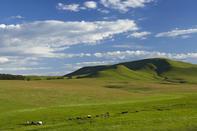Fort Nottingham
Nottingham was inhabited by Voortrekker boers in the 1940s, who settled in the area when Britain annexed the Boer Republic of Natalia. By the 1950s, most of the families sold their farms to British settlers, and the town took root as a tented camp.

It was originally set up by the Sherwood Foresters in 1856. As the community started to thrive, Bushmen in the area increased their raids on the settlers’ homes. Around 1853, desperate farmers pleaded with the Acting Governor of Natal to provide protection from the raids. A small military outpost was built to act as a ‘buffer zone’ which lead to the establishment of Fort Nottingham.
The town was then named after the Nottinghamshire Regiment stationed in the area during the building of the fort. The fort and some of the early buildings can be seen today at the Fort Nottingham Museum. In 1880, work on the Durban-Johannesburg railway began, but the station was over 20 miles from the original fort and the settlement moved more towards the station.
The station really transformed the town and area, enabling farmers to transport goods to and from Pietermaritzburg. The Nottingham Road Farmers Association was formed in October 1887 and the area became increasingly popular after the Railway Hotel was built. It is now a prime holiday destination due to its trout fishing and clean, country-fresh air.